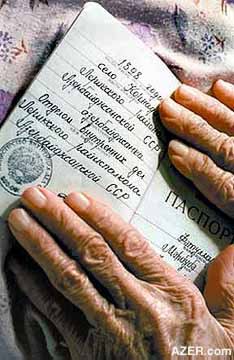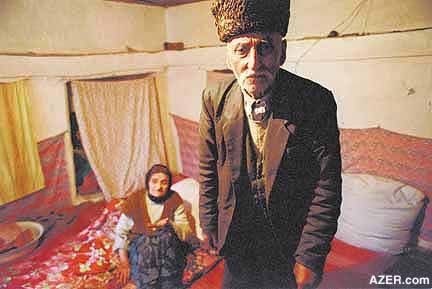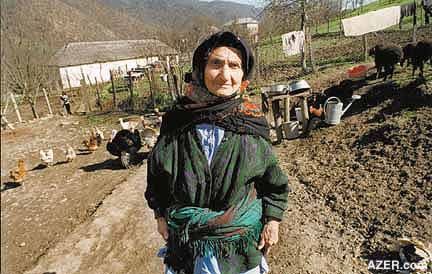|

Summer 2001 (9.2)
Pages
24-25
Secrets of Longevity
On Verdant
Slopes of the Talysh Mountains
by Kathy
Lally
Published in the Baltimore Sun (Maryland) on April 17, 2001.
Copyright 2001, The Baltimore Sun Company
All photos: Algerina Perna, Associated Press.
  PESHTATUK, Azerbaijan
- Mahbuba Fatullayeva drops to the floor with all the flexibility
of a 12-year-old, sits cross-legged on her mat and waits patiently
for the inevitable question to emerge from the gaggle of relatives
and strangers crowding around her with enormous bustle and confusion. PESHTATUK, Azerbaijan
- Mahbuba Fatullayeva drops to the floor with all the flexibility
of a 12-year-old, sits cross-legged on her mat and waits patiently
for the inevitable question to emerge from the gaggle of relatives
and strangers crowding around her with enormous bustle and confusion.
These people - women from America, scientists from Baku, a reporter
from nearby Lankaran - are demanding one thing, loudly and urgently:
How did Fatullayeva, born 103 years ago, manage to live so long?
Left: At 103, Mahbuba Fatullayeva
still anticipates more active years as villagers in the Talysh
region are known for their longevity.
"I have prayed to God all my life," Fatullayeva says.
"I'm a kind person, and I've never envied anyone. I have
always been with nature. I knew the value of life. That's why
I kept myself from rumors, and I was relaxed."
No one finds old age remarkable on the verdant slopes of the
Talysh Mountains, close to the Iranian border and more than 200
miles south of the Azerbaijani capital, Baku. Old age doesn't
begin until at least 90.
Fatullayeva says she has never been to a doctor. She has never,
a daughter-in-law says, left this hamlet of 30 houses. No, another
relative contradicts, she certainly has traveled to the far sheep
meadow.
Looking out the window, it's as if rich green velvet has been
draped over the whitewashed stone house, with the mountainside
tilting so sharply down that the lush and brilliant grass seems
pressed against the window. Chocolate-colored sheep graze peacefully,
and turkeys with bright blue necks are on patrol. Freshly washed
clothes flutter on the fence.
Though it appears isolated, Peshtatuk is not cut off from the
rest of the world. Buses travel the road to the city of Lankaran
near the Caspian Sea, and a train and buses run north to Baku.
Still, lives are measured out in different rhythms here, the
tone is set by work and it's easy enough for a hundred or so
birthdays to pass unsung. "We have never celebrated my birthday,"
Fatullayeva says. "I'm not even interested."

Above: Fazil Rezayev, 102,
and his wife, Bodzhi, 101, live in the mountainous village of
Chairud.
Every morning, Fatullayeva rises from her sleeping pallet on
the floor, has something to eat and begins to work. "Sometimes
I eat milk, yogurt, honey," she says, "anything that
comes my way."
She feeds the chickens, she makes butter and she washes. A granddaughter
drags in a vase-shaped clay pot, about 2 1/2 feet tall, to show
how butter is made. Fatullayeva's job is to rock the pot for
30 minutes or more, until the butter forms. Her hands, she says,
are beginning to get weak and she has a rag tied around one to
steady it. "The last three or four years," she says,
"I felt I was getting old."
Fatullayeva was born into the Russian empire ruled by a czar.
She remembers the Bolshevik Revolution and Lenin's path to power.
She lived through the rise and fall of the Soviet Union and saw
Azerbaijan become independent. Now she's disappointed because
all that history has left her country poor and jobless. "My
great-grandsons have nothing to do here," she says. "That's
my biggest complaint."
Sevinj Huseinova, a biologist who works in the Laboratory of
Long Life at the Institute of Physiology in Baku, says an extraordinary
number of people do live long lives here - long being about 110
- because of genetic factors enhanced by diet, exercise and fresh
air.
Eat yogurt along with garlic and mint, says Chingiz Gasimov,
the laboratory director. Eat cilantro and chives, saffron and
tarragon, and sumakh, a red spice made from dried berries, he
says, and such a diet will prevent cholesterol. And, Huseinova
counsels, forget about the news. "The less information a
person has," she says, "the longer he lives. There's
less stress."

Above:
Mahbuba
Fatullayeva, 103, spends her day doing farm shores such as feeding
the chickens and churning butter by hand.
At the end of World War II, she says approvingly, a group of
nearby villagers wrote to Stalin, wondering why they had only
just been told a war had raged the previous four years. Too much
information, Huseinova says, overloads and finally ruins the
brain. She looks sadly at the newspaper reporters with her. "Less
information," she advises. "Less information."
She shares information, though. Huseinova recalls a man of 128
she once knew. "He had three wives," she says. "With
such a man, a woman can't live long - they each had 12 children."
"I know of a woman of 105," says Aghaddin Babayev,
a local journalist who covers a vast territory by bus, "and
she doesn't look a day over 80. Another woman - she looks as
good as a 75-year-old."
But times are growing more difficult, Babayev says, and people
are feeling it and dying younger. "Ten years ago, it was
a ridiculous thing to die before 90," he says. "We
used to say if someone doesn't live until 100, it's their own
fault."
Elkhan Gambarov, a mere 55, lives higher in the mountains, in
Lerik - elevation about 6,000 feet. His grandfather, he says,
lived to 167, a record widely reported but not conclusively proved
to Western scientists, who are skeptical about documents in this
part of the world. But Gambarov encourages today's pursuit. More
than 200 people older than 90 live in the region, he says, as
the travelers head deeper into the mountains.
The great silence of the mountains is unbroken except by ringing
cell phones. There are four Azerbaijanis in the car - townsfolk
all - and each has a cell phone. "It's our great achievement,"
Gasimov says.
Nearly the entire country is covered by a network, which overnight
began offering cheap cellular service to customers who had been
waiting years for regular phones.
Gasimov's phone rings. "I'm above the snow line," he
shouts to a friend in Baku, calling to invite him to a party.
The car climbs, bumping up, up and around the narrow roads, which
narrow even more as the mountain plunges precipitously down to
a ravine. The driver stops, the group frets. Can they drive on
without plunging downward?
A solution: There's a car in the distance, on the other side
of the dangerous patch. Gasimov shouts to a nearby house, asking
the woman standing in the yard to shout the message from house
to house across the mountain: "Send a car."
A few minutes later, a 30-year-old Soviet jeep rounds the bend
and screeches to a halt, gravel spewing under its tires. A man
leans out the window, looking like an old-time film star in silky
flowing scarf and a sweeping purple overcoat. "Get in,"
shouts Abusahad Gurbanov, who teaches Russian at the local school.
The car roars off, more gravel spraying, up and around the mountain,
coming to a halt in front of a small stone house in the village
of Chairud. The group disgorges and dashes in, hurrying to find
the secret to old age-and get off the mountain before darkness
falls.
A group of neighbors quickly gathers and enters the house, too,
excitedly shouting and pressing close to Fazil Rezayev, 102,
and his wife, Bodzhi, 101. She rises stiffly to her feet and
says she feels old.
"I am a religious person, and I have always fasted and always
prayed," explains Fazil, a Shiite Muslim, the traditional
Azeri faith.
An 80-year-old neighbor, who looks much younger, offers a running
commentary above the cacophony of questions and the answers,
which are nearly all contradicted by at least one bystander.
"Everything I eat I get from nature," says Aghamirza
Ahmadov. "The cow drinks clear water and eats nourishing
grass, and I drink the good milk."
He expects to live to 110.
Darkness threatens, and voices rise even higher, urging a swift
departure. The Rezayevs' 65-year-old son, Nasir, jumps in the
car for a high-speed interview on the run.
His father, he concedes, has lived through epic and tumultuous
change.
"But now life is unprecedented," Nasir says. "Previously,
it took dozens of years to change. Now, you don't know what's
going to happen tomorrow."
Now, he says, the cemetery is rapidly growing larger. In the
past four months, four people older than 100 have died, he says.
"There were years in my life when not one person in the
village died."
The ancient car has reached the treacherous spot in the road.
The visitors jump out and into their own car.
They speed off into the night. Soon, the cell phones are ringing
again. Behind them, on the receding mountain, all is calm.
For more on Azerbaijan's centenarians, see "Centenarians
in Azerbaijan: Heredity as Stored Environment" in AI 2.3, Summer 1994
and "Azerbaijan's
Legendary Centenarian Shirali Muslimov" in AI 4.4, Winter 1996.
_____
From Azerbaijan
International
(9.2) Summer 2001.
© Azerbaijan International 2001. All rights reserved.
Back to Index
AI 9.2 (Summer 2001)
AI Home
| Magazine Choice | Topics
| Store
| Contact
us
|